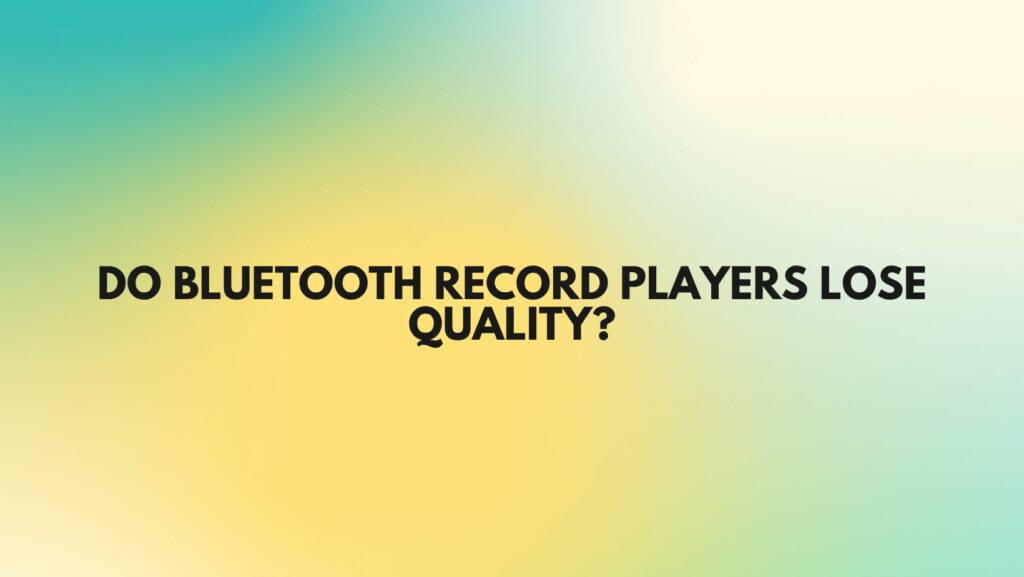Vinyl records have enjoyed a resurgence in popularity in recent years, with many music enthusiasts rediscovering the analog charm of this format. However, with the advent of modern technology, there’s a growing trend towards Bluetooth record players, which enable users to stream music wirelessly to their speakers or headphones. But this leads to a common question: do Bluetooth record players lose quality compared to their wired counterparts? In this article, we’ll explore the intricacies of Bluetooth record players, their impact on audio quality, and whether these concerns are well-founded.
Understanding Bluetooth Technology
Bluetooth technology is a wireless communication protocol that allows devices to exchange data over short distances. In the context of audio, Bluetooth is commonly used to connect sources like smartphones, tablets, and laptops to speakers, headphones, and, in this case, record players. It operates within the 2.4 GHz radio frequency range and employs various codecs to compress and transmit audio data.
The Impact on Audio Quality
- Compression and Data Loss:
One of the primary concerns with Bluetooth record players is the compression of audio data. Bluetooth audio typically uses lossy compression codecs like SBC (Subband Coding) or AAC (Advanced Audio Coding). These codecs aim to reduce data size to allow for efficient wireless transmission, but they inevitably result in some audio data loss. This means that when audio is sent from the record player to a Bluetooth speaker or headphone, some fidelity is sacrificed.
However, it’s essential to note that the degree of data loss may not be immediately noticeable to the average listener, especially in casual listening environments. It becomes more apparent in critical listening scenarios or with high-quality audio equipment.
- Bluetooth Codec Quality:
The quality of the Bluetooth codec used plays a significant role in determining the audio fidelity. Newer codecs like aptX, aptX HD, LDAC, and AAC generally offer higher audio quality with less compression. High-end Bluetooth record players may use these codecs to mitigate the loss of audio data and provide a more enjoyable listening experience. It’s important to check the codec compatibility between your record player and playback device to maximize audio quality.
- Signal Interference and Range:
Bluetooth can be sensitive to signal interference and may suffer from dropouts or audio artifacts when there is significant interference. This interference is more likely in crowded wireless environments or when the playback device is too far from the record player. To mitigate these issues, make sure you have a clear line of sight between the two devices and avoid physical obstructions.
Benefits of Bluetooth Record Players
While Bluetooth record players may compromise some audio quality compared to wired setups, they come with several advantages:
- Convenience: Bluetooth record players eliminate the need for a physical cable connection, providing a clutter-free setup and hassle-free mobility.
- Versatility: You can easily switch between playing vinyl records and streaming digital audio from your phone or tablet without changing your audio source.
- Compatibility: Bluetooth connectivity ensures that your record player can connect to a wide range of Bluetooth-enabled speakers and headphones, making it more accessible to various audio devices.
- Integration: Bluetooth record players can be integrated into modern smart home setups, allowing for remote control and voice-activated commands.
Conclusion
In conclusion, Bluetooth record players do involve some compromise in audio quality due to the use of compression codecs, potential signal interference, and other limitations. However, the extent of this loss in quality is often manageable and may not be a deal-breaker for many users, especially in casual listening scenarios.
If you’re an audiophile who values the highest fidelity, a wired record player setup with high-quality components might be a better choice. However, for the majority of users looking for a convenient and versatile audio solution, a Bluetooth record player can provide an excellent compromise between convenience and audio quality. Ultimately, the decision comes down to personal preferences, priorities, and listening habits.


